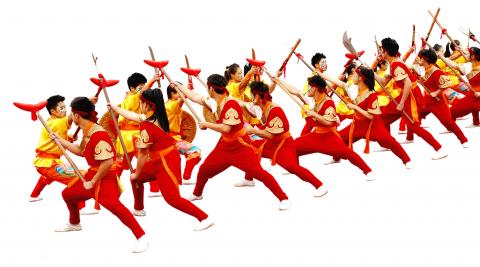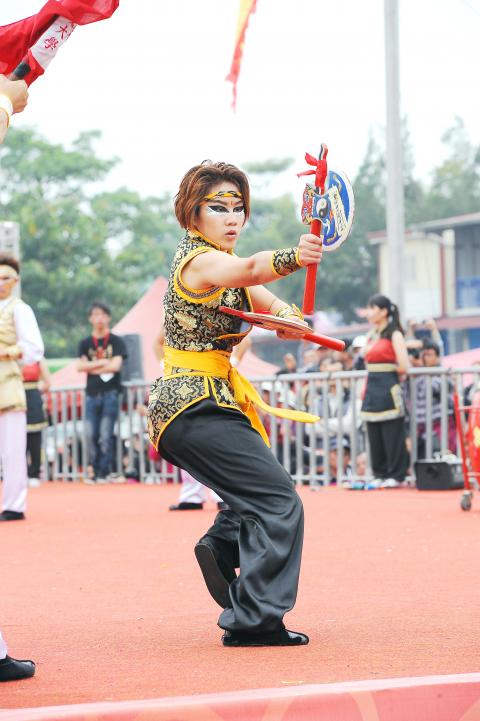This weekend, thousands of martial arts fans are expected to descend on Greater Kaohsiung’s Neimen District (內門) to watch a week-long lineup of Song-Jiang Jhen Battle Array (宋江陣), a form of performing arts that combines elements of kung fu, dance and drumming.
The festival, now in its 12th year, invites martial arts troupes from home and abroad to showcase their best moves. Groups of college students will also take part in a creative competition, which is aimed at revitalizing the tradition.
Originating over a century ago, the battle array was named after Song Jiang (宋江), leader of a group of bandits who lived during the Song Dynasty. In training his henchmen, Song would divide them into two groups and have each person carry a weapon. A round of mock duels would then follow.

Photos Courtesy of Kaohsiung City Government
The method was so successful in preparing the men for battle, it was later adopted as a regular military exercise to boost defense capability and ward off pirates, bandits and neighboring clans. A wide variety of weapons, strategies, formations and music were applied to make the exercise more challenging.
Over the years, the battle array has transformed itself into a ritual that is performed in temples to honor the birthdays of deities. Today, temples in southern Taiwan organize the performance teams themselves. Although a full-size team consists of 107 members, it is more common to see a 72 or 36-member array.
Recognizing that the custom has been slowly dying out, the Kaohsiung City Government, in cooperation with local temples, has been holding a series of activities in Neimen to revive interest in the performance art.

Photos Courtesy of Kaohsiung City Government
“Neimen is a special place … Its population stands at 15,000, but it has 50 to 60 martial arts performance troupes,” said Deputy Mayor Lee Yung-te (李永得) at a press conference held to launch the annual festival.
Many uprisings took place in Neimen in the past, including a large scale anti-Manchu protest led by Chu Yi-kuei (朱一貴) in the early 18th century. Neimen people’s valor and courage both in the past and present contributed greatly to Taiwan’s battle array culture, he said.
Introducing the battle array as an art that integrates sports and music, Lee said that the event is a great way to experience Taiwan’s rich cultural heritage. Photo exhibitions, calligraphy shows and a culinary extravaganza will also be held alongside the performances. Complete details in Chinese and English can be found at: www.who-ha.com.tw.

Taiwan has next to no political engagement in Myanmar, either with the ruling military junta nor the dozens of armed groups who’ve in the last five years taken over around two-thirds of the nation’s territory in a sprawling, patchwork civil war. But early last month, the leader of one relatively minor Burmese revolutionary faction, General Nerdah Bomya, who is also an alleged war criminal, made a low key visit to Taipei, where he met with a member of President William Lai’s (賴清德) staff, a retired Taiwanese military official and several academics. “I feel like Taiwan is a good example of

March 2 to March 8 Gunfire rang out along the shore of the frontline island of Lieyu (烈嶼) on a foggy afternoon on March 7, 1987. By the time it was over, about 20 unarmed Vietnamese refugees — men, women, elderly and children — were dead. They were hastily buried, followed by decades of silence. Months later, opposition politicians and journalists tried to uncover what had happened, but conflicting accounts only deepened the confusion. One version suggested that government troops had mistakenly killed their own operatives attempting to return home from Vietnam. The military maintained that the

Before the last section of the round-the-island railway was electrified, one old blue train still chugged back and forth between Pingtung County’s Fangliao (枋寮) and Taitung (台東) stations once a day. It was so slow, was so hot (it had no air conditioning) and covered such a short distance, that the low fare still failed to attract many riders. This relic of the past was finally retired when the South Link Line was fully electrified on Dec. 23, 2020. A wave of nostalgia surrounded the termination of the Ordinary Train service, as these train carriages had been in use for decades

Lori Sepich smoked for years and sometimes skipped taking her blood pressure medicine. But she never thought she’d have a heart attack. The possibility “just wasn’t registering with me,” said the 64-year-old from Memphis, Tennessee, who suffered two of them 13 years apart. She’s far from alone. More than 60 million women in the US live with cardiovascular disease, which includes heart disease as well as stroke, heart failure and atrial fibrillation. And despite the myth that heart attacks mostly strike men, women are vulnerable too. Overall in the US, 1 in 5 women dies of cardiovascular disease each year, 37,000 of them